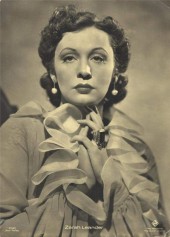Zarah Leander (March 15, 1907 June 23, 1981) was born as Zarah Stina Hedberg in Karlstad, and died in Stockholm.
Although Zarah Leander studied piano and violin already as a small child, and sang on stage for the first time at the age of six, she made a serious attempt at an ordinary life. As a teenager she lived two years in Riga (19221924), learned the then most important international language, German, took up work as a secretary, married Nils Leander (1926), and had two children (1927 & 1929). However, in 1929 she was engaged, as an amateur, in a touring cabaret by the leading entertainer and producer Ernst Rolf and for the first time sang "Vill ni se en stjärna," ('Do you want to see a star?') which soon would become her signature tune.
In 1930, she participated in four cabarets in the capital, Stockholm, made her first records, including a cover of Marlene Dietrich's "Falling in Love Again," and played a part in a film. However, it was as Hanna Glavari in Franz Lehár's operetta The Merry Widow that she had her definitive break-through (1931). By then she had divorced Nils Leander. In the following years, she embarked on a splendid career and could make a decent living as a popular artist on stage and in film in Scandinavia. Her fame brought her proposals also from the European continent and from Hollywood, where a number of Swedish actors and directors were working. A second breakthrough, by contemporary measures her international debut, was the world premiere (1936) of Axel an der Himmelstür at the Theater an der Wien in Vienna, directed by Max Hansen.
Zarah Leander played roles with, basically, the same personality in all her German films; some said she played herself. Her's was the role of a femme fatale, independently minded, beautiful, passionate and self-confident. Many of her songs had a frivolous undertext, or could at least be interpreted that way. Her last film in Nazi Germany premiered on March 3, 1943. Her villa in the fashionable Berlin suburb of Grünewald was hit in an air raid, and the increasingly desperate Nazis pressured her to apply for German citizenship. At this point she decided to break her contract with Ufa, leave Germany, and retreat to Sweden, where she had bought a mansion at Lönö, not far from Stockholm.
After the Wehrmacht's defeat in the 1943 Battle of Stalingrad, public opinion in Sweden, the government of which remained officially neutral throughout the war, nonetheless shifted towards criticism of the Nazis, and people's sympathies were increasingly pro-Allied and pro-American. Zarah Leander had been far too extensively associated with Nazi propaganda, and was shunned. But gradually she managed to land engagements on the Swedish stage, and after the war she did eventually return to tour Germany and Austria, giving concerts and acting in musicals. But she would never regain the popularity she had enjoyed before and into the first years of World War II.
Films:
1930 - Dantes Mysterien
1931 - Der falsche Millionär
1935 - Skandal
1937 - Premiere
1937 - Zu neuen Ufern
1937 - La Habanera
1938 - Heimat
1938 - Der Blaufuchs
1939 - Es war eine rauschende Ballnacht
1939 - Das Lied der Wüste
1940 - Das Herz der Königin
1941 - Der Weg ins Freie
1942 - Die große Liebe
1943 - Damals
1950 - Gabriela
1952 - Cuba Cabana
1953 - Ave Maria
1954 - Bei dir war es immer so schön
1959 - Der blaue Nachtfalker
1964 - Das Blaue vom Himmel
1966 - Das gewisse Etwas der Frauen
